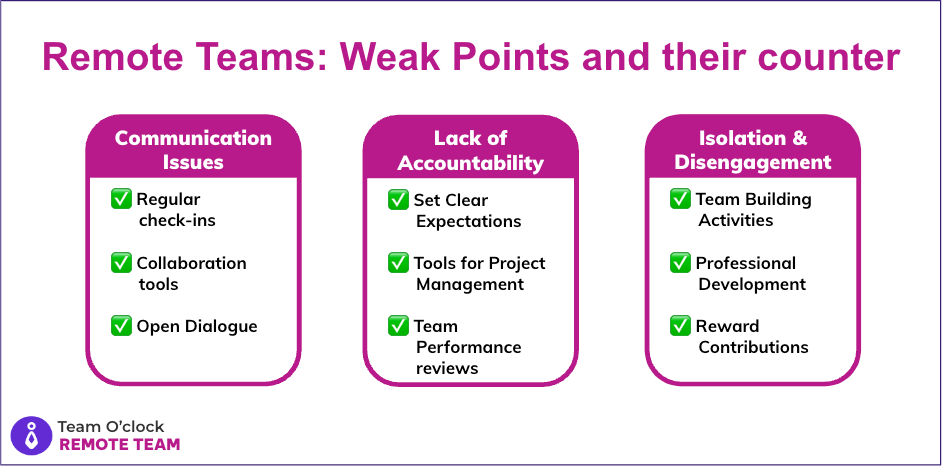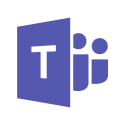
How to Identify Your Remote Team's Weak Points and Improve Them in 3 Ways

Remote work has become the new norm for many organizations worldwide and opened up a new way of collaboration. While it offers flexibility and convenience, it also presents unique challenges that can affect team performance.
Identifying and addressing weak points in your remote team is crucial for maintaining productivity and team morale. In this blog, we'll expand on how to spot these weak points and provide three practical ways to improve them. We'll also introduce you to Team O'Clock's agile solutions, which can help streamline your remote team's workflow.
How to Identify Weak Points in Your Remote Team
1. Communication Issues
One of the most common problems in remote teams is communication breakdown. Signs of poor communication include missed messages, misunderstandings, and a lack of information sharing. These issues can lead to decreased productivity, confusion, and frustration among team members.
2. Lack of Accountability
Tracking progress and ensuring accountability can be difficult when team members work remotely and in different time zones. If deadlines are consistently missed or there's a lack of clarity about who is responsible for what, your team may struggle with accountability. This can negatively impact project timelines and the quality of work delivered.
3. Isolation and Disengagement
Remote work can lead to feelings of isolation and disengagement among team members. If you notice a drop in participation during meetings, less collaboration, or signs that team members are not motivated, these could be indicators of isolation. This can affect team cohesion, morale, and overall motivation.
How to Improve Communication
✅ Implement Regular Check-ins
Regular check-ins are essential for keeping communication channels open. Daily stand-ups or weekly meetings can ensure everyone is on the same page. These meetings provide a platform for team members to share updates, discuss challenges, and plan their tasks. Tools like Zoom or Microsoft Teams can facilitate these check-ins effectively.
✅ Use Collaboration Tools
Using the right collaboration tools can significantly enhance communication in remote teams. Platforms like Slack or Microsoft Teams enable real-time messaging and file sharing, making it easier for team members to stay connected.
Establishing guidelines for tool usage, such as response times and appropriate channels for different types of communication, can further improve efficiency and not compromise the project's progress.
✅ Encourage Open Dialogue
Creating a culture of transparency is vital for effective communication. Schedule daily standups and encourage team members to express their ideas, concerns, and feedback openly. Techniques like anonymous surveys or feedback forms can foster open communication, ensuring everyone feels heard and valued.
How to Enhance Accountability Among Team Members
✅ Set Clear Expectations
Clearly defining roles and responsibilities is the first step towards enhancing accountability. Ensure that every team member knows what is expected of them, including specific goals and deadlines. This clarity helps prevent confusion and unproductive tasks and ensures everyone is working towards the same objectives.
✅ Use Project Management Tools
Project management tools like Trello, Asana, or Jira can help track progress and ensure accountability. These tools allow you to assign tasks, set deadlines, and monitor real-time progress. Using these tools effectively lets you keep everyone on track and identify potential issues early on.
✅ Schedule Regular Performance Reviews
Regular performance reviews and retrospectives are essential for providing feedback and maintaining accountability. These reviews should focus on individual and team performance, highlighting strengths and areas for improvement. Structured feedback loops help ensure team members are aware of their performance and can make necessary adjustments.
How to Boost Engagement and Team Morale
✅ Introduce Team Building Activities
Virtual team-building activities can strengthen team bonds and boost morale. Activities like fun retrospectives, virtual coffee breaks, or team-building games can provide a much-needed break from work and help team members connect personally. These activities can be simple yet effective in fostering a sense of community.
✅ Offer Professional Development Opportunities
Investing in professional development is crucial for keeping team members engaged and motivated. Offer opportunities for remote training, webinars, or online courses to help team members grow their skills. Encouraging continuous learning not only benefits the individual but also enhances the overall capabilities of the team.
✅ Recognize and Reward Contributions
Recognition and rewards play a significant role in maintaining team morale. Regularly acknowledging team members' hard work and achievements can boost motivation and satisfaction. Consider creative ways to reward remote employees, such as virtual shout-outs, agility cards, or extra time off.

Takeaway
Addressing the weak points in your remote team is essential for maintaining a productive and motivated workforce. You can create a more cohesive and efficient team by improving communication, enhancing accountability, and boosting engagement. Regular check-ins, proper collaboration and project management tools, clear expectations, team-building activities, professional development, and recognition are all key strategies to achieve this.
Team O'Clock provides simple strategies and offers agile solutions designed specifically for remote teams, helping you streamline workflows and enhance productivity.
Explore our tools and services to see how we can contribute to your team's success. Start your free 15-day trial today to experience the benefits firsthand.








